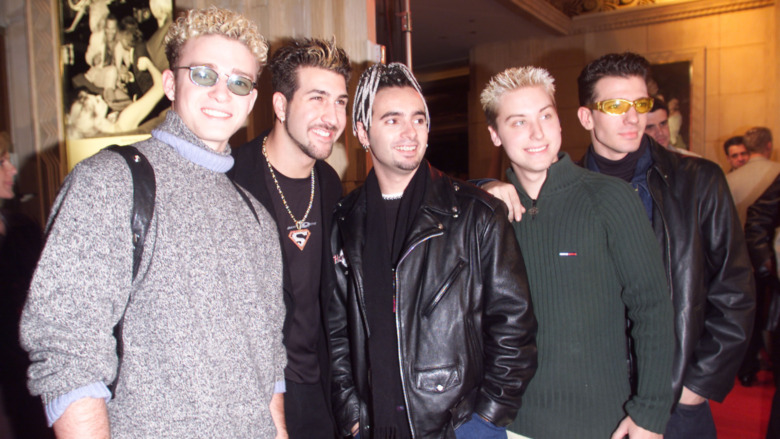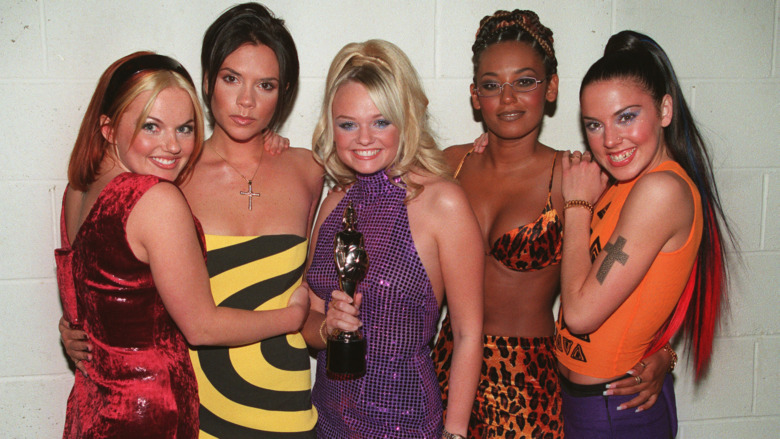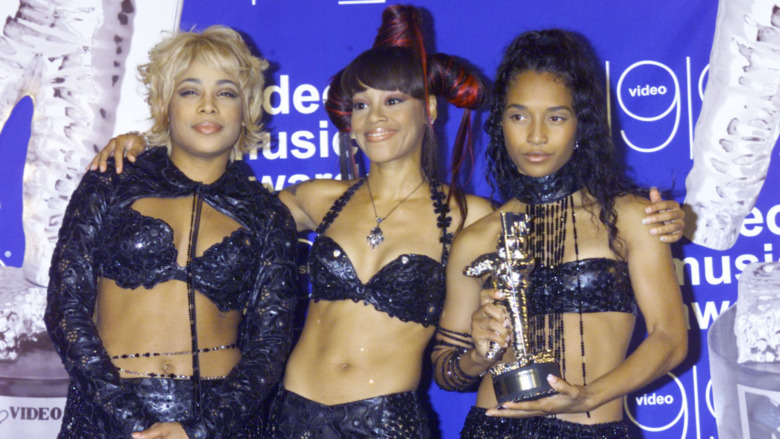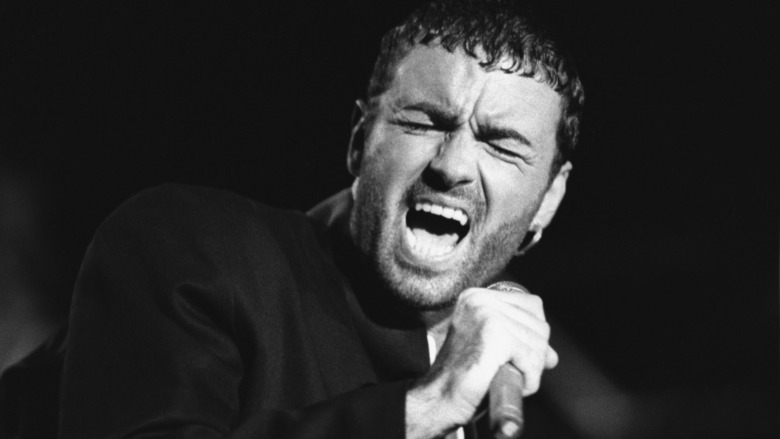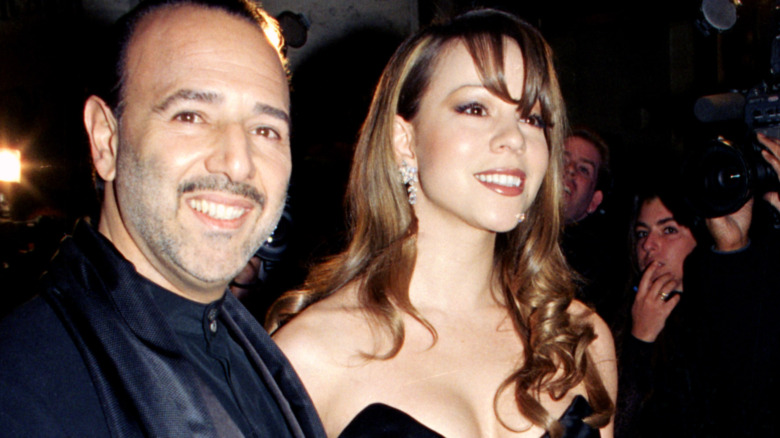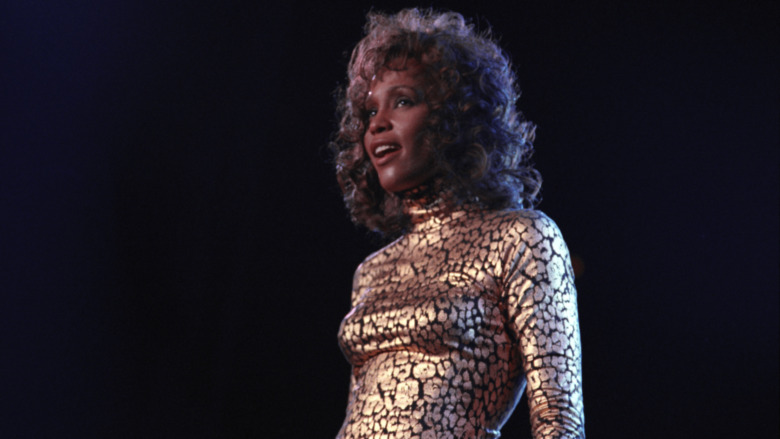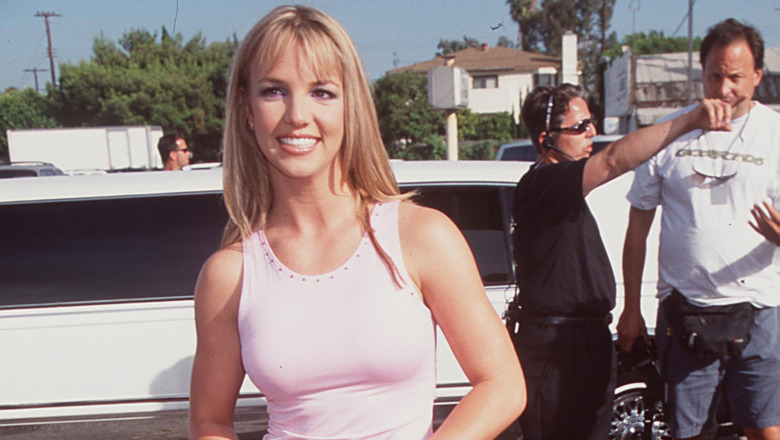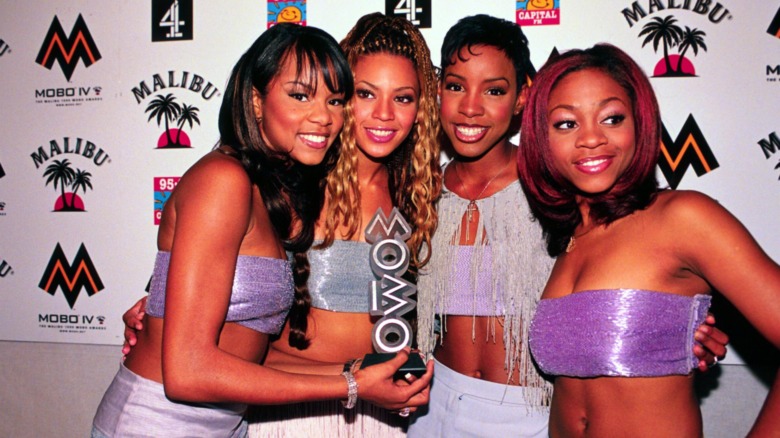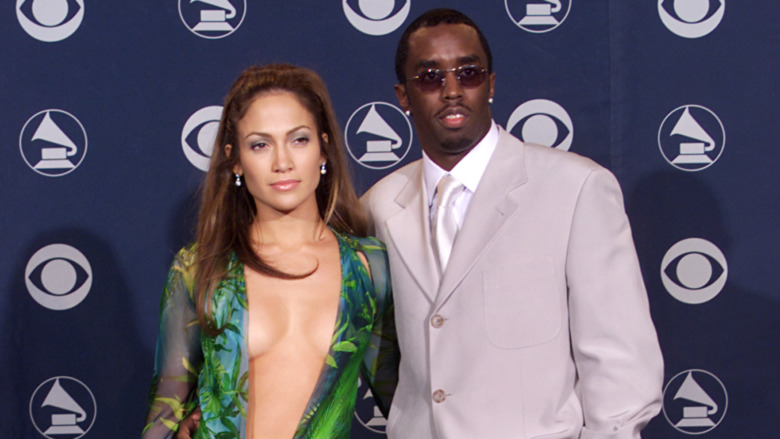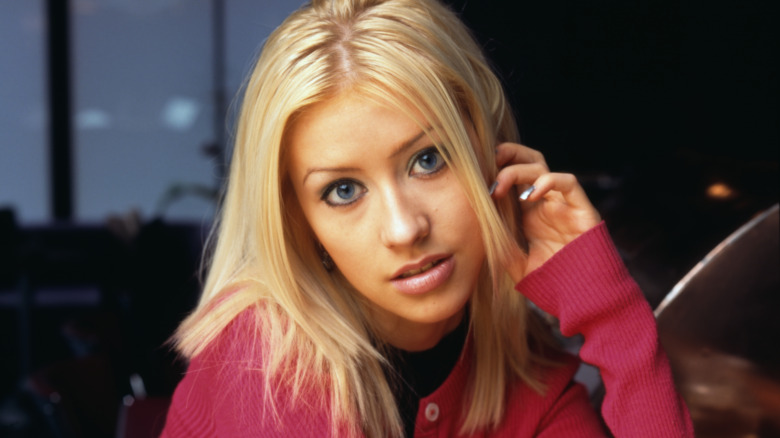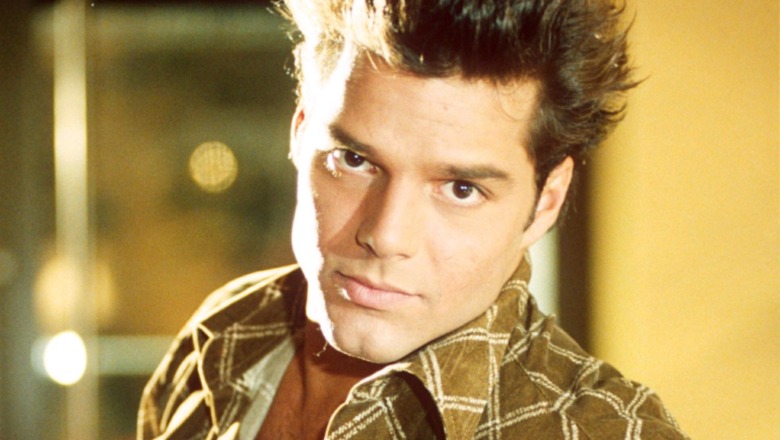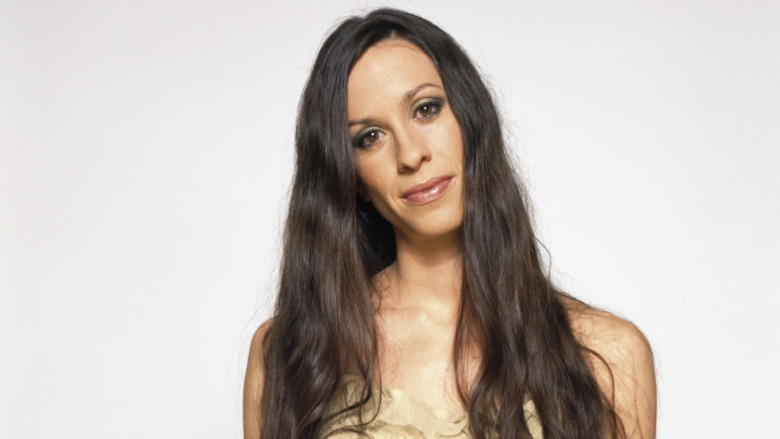The Dark Truth About Being A Pop Star In The '90s
When we think of '90s pop music, we remember fads like coordinated dance moves, body glitter, butterfly clips, and lots of baggy clothing. The glamorous lives of the decade's pop stars make it hard to imagine that many of them were met with some dark shades of fame, and even heavier doses of reality.
The '90s gave birth to an international boy and girl band boom, and many children who starred in The Mickey Mouse Club became teen idols. But from dirty music contract dealings, to body image pressures, to outright abuse, music stars of the '90s learned that the industry wasn't all sugar and spice.
Record moguls and managers who sought to both financially and psychologically take advantage of the talent they represented sadly succeeded. Sometimes, managers even married the very young stars. Pressures and expectations of fame would often cause mental and emotional breakdowns, some in public.
It turns out the price of fame is quite high for those who dance and sing their way to the top of the pop charts. Read on to relive the bad, sad, and ugly secret world of the '90s music industry.
Managers exploit you
Lou Pearlman managed two "larger than life" boy bands in the '90s: 'N Sync and the Backstreet Boys.
While he may have had a hand in making them stars, Pearlman was a ruthless extortionist, working the band members to the bone and paying them pennies in the process. At one point, the members of 'N Sync were making $35 a day, according to The Guardian. It took three years of performing and selling millions of records until they received their "share" of the profits. But Lou Pearlman offered each member of 'N Sync a mere $10,000 each, which was when they began calling their lawyers. Once under the microscope, Pearlman tried justifying his actions by claiming that the band's contract stated he was legally entitled to 90 percent of the members' earnings.
But that wasn't even the worst thing about Lou Pearlman. He was also accused of sexual assault. In a YouTube documentary, The Boy Band Con, former boy band members under Pearlman discuss the controversial music mogul. In the doc, 'N Sync's Lance Bass says, "He was very touchy-feely ... It always felt a little like, okay, I know what you are doing." Rich Cronin, one of the members of boy band LFO, claimed that Pearlman asked his group to "fondle his penis as 'practice' for meetings with German music executives."
After taking advantage of many music stars for over 20 years, Pearlman was eventually exposed and thrown in jail. He was serving his 25-year sentence when he died of cardiac arrest in 2016.
Bullying still occurs among your peers
The Spice Girls are still a legendarily successful pop girl band for the ages, with five very distinct members who each had their own personas. The group's debut single, "Wannabe," in 1996 shot to No. 1 in 37 countries, making them instant international superstars. Their first album, Spice, sold 31 million copies.
Unfortunately, it was later revealed that Melanie Chisholm or Mel C, better known as "Sporty Spice," was bullied and suffered from depression and an eating disorder. She has also stated that she had trouble fitting into the pop star world. Chisholm admits she experienced feelings of guilt and imposter syndrome when the group became mega famous, according to The Telegraph. She also later revealed that one of her fellow Spice Girls was mean to her throughout the group's tenure together. Though she never revealed which group member it was, she told Attitude that "It's been addressed" and that "they were aware of what they'd done" and "apologized" (via TheGamer).
Today, Melanie is in a better place. "I just kind of feel like I can exhale because I don't need to search any more, I just need to embrace all these parts of myself," she told The Mirror. "Like everybody, we are so complex, and there are so many sides to us."
You can still go bankrupt
Fans think the life of a pop star is glamorous and opulent if you're selling millions of records, and everyone knows your name. But it's never that simple.
'90s Pop/R&B trio sensation TLC garnered four Grammy Awards, five MTV Video Music Awards, and five Soul Train Music Awards and were chart-toppers for a long time. Their album CrazySexyCool stayed on the Billboard 200 for over two years.
Nevertheless, they filed for Chapter 11 bankruptcy at peak fame in 1995, declaring debts of $3.5 million, according to Beat. It turns out their music contract favored their label and manager over its performers. The contract allowed for back pay to compensate for airline travel, taxes, lawyer expenses, and more. The stingy fine print allotted for the band to make 56 cents per album sold, and to divide it by three. According to the group, the more successful they became, the deeper in debt they fell.
The trio would have to cope with tragedy a mere few years following their peak success, when Lisa "Left Eye" Lopes was tragically killed in a car accident while on vacation in Honduras.
Your private life can be publicly outed
It's hard to fall in love when you're famous, and it's even harder when you're in the closet. George Michael was about as big a music star as you can get, with 10 hits that reached Billboard's No.1 spot, but his status at the top was challenged one night.
In 1998, George Michael was forced to come out as a gay man after a controversial incident involving the police and a public bathroom in Beverly Hills. George was busted when he tried to pick up an undercover cop at a well-known spot for gay men to meet. Afterward, he attempted to control the narrative, claiming entrapment. (It had been widely speculated George was gay for years.) He officially came out in an exclusive CNN interview shortly after the arrest. "I honestly think it was a desperate attempt to make the trauma in my life about me, because then, maybe, I could control the outcome," Michael told GQ Magazine. "Up to then, the traumas had been out of control and the outcome always bad."
George had to go into fighter mode to defend his career after the incident, but it would never be the same. The struggle sounds trivial now, as music stars today can be out in the open about their sexuality without their career taking a hit. If anything, their authenticity is often celebrated, and it becomes part of their artistic appeal.
You can get trapped in an abusive marriage
Pop diva Mariah Carey, with her trademark high-pitch perfect voice, was at the top of the music chain in the '90s. When Carey became famous, her family started treating her like "an ATM with a wig on," but the real darkness began when she married powerful Sony music mogul Tommy Mottola, who controlled, threatened, and abused the young star.
The two had a 20-year age gap when they wed, and Carey has since compared the union to her being a child bride. "He was older than me by a lot and had a lot of power and he wanted me to remain away from most people, like sequestered," Mariah told Cosmopolitan (via Parade). According to her, she had to ask for permission to even leave the house. The couple stayed married for eight years until Mariah finally left.
In his book, as discussed by Billboard, Mottola expressed remorse for their romantic partnership. He admitted that the relationship was "wrong and inappropriate" and stated that he was "truly sorry for any discomfort or pain." He also called many of Mariah's recollections "lots of crap."
Racism still applies
One of the most loved and well-known pop singers of the '90s, Whitney Houston, was constantly told she wasn't "black enough" for the R&B community and was groomed early on to appeal to a white audience. According to the Showtime documentary Whitney: Can I Be Me (via HuffPost), her image was a conscious effort by Clive Davis and Arista Records to "bury the New Jersey native's 'hood' upbringing and make her 'classy.'"
Though many of her hits played on the R&B airwaves, Houston received significant pushback from the Black community at the time. She was booed at the 1989 Soul Train Awards while presenting. Reverend Al Sharpton even labeled her "Whitey" Houston.
"You're not black enough for them," Houston later said in an interview, recounting the criticism. "You're not R&B enough. You're very pop. The white audience has taken you away from them." Houston struggled with pleasing both audiences her entire career, and she never perfectly fit into the right box of a "stereotypical black female artist," as written by Brandon Tensley in The Atlantic. She paved the way for future Black pop stars like Beyoncé and Rihanna, who have both spoken out about double standards when it comes to race in the music industry.
Your image is micromanaged
Britney Spears was just a teenager when she became a megastar, and from day one, her squeaky-clean, girl-next-door, pop princess image was calculated with every move she made. As Bidisha writes in The Guardian, "And what must a princess be? Well, white and Aryan preferably, but also ever-smiling, pure, gracious, grateful and — above all — well behaved." Spears was groomed from an early age as a cast member of The Mickey Mouse Club, alongside onetime pop prince boyfriend Justin Timberlake.
But when she decided to go outside of that persona, she was criticized and hyper-sexualized, eventually leading her to a major public breakdown in front of the paparazzi. Britney survived the damaging press and ultimately kept performing. In 2018, she took up a residency in Las Vegas in a show called "Domination."
To this day, Britney Spears still doesn't quite own her own narrative and is still technically under a conservatorship managed by her father, which she is now legally pushing back on.
You're easily replaced
Girl group Destiny's Child shot Beyoncé into the limelight, and she's never left. However, before the group sold hit records, there were two former controversial members. In fact, there was almost never a group to begin with, as Beyoncé threatened to go solo early on.
The original foursome broke out onto the music scene in 1997 with their hit single, "No, No, No," and they swiftly became known for their recurring theme of female empowerment. The ladies were longtime childhood friends and recorded two records together, but LaTavia Roberson and LeToya Luckett soon began claiming unfair treatment, including unequal pay and favoritism toward Beyoncé. The two were kicked out of the group after asking for new management.
"They had questions about the money they were earning, and they felt they were not getting enough attention both on record and on stage," author J. Randy Taraborrelli writes in his book, "Becoming Beyoncé" (via RadarOnline). "Stop throwing shade at me and Beyonce when the truth is that you're pissed off at Mathew," the author claims Kelly Rowland said to LeToya and LaTavia concerning their manager. After being kicked out without warning, LeToya, only 18, revealed she slept in her car for a time. "During my journey I was staying at people's houses ... I slept in a car in LA while I was making my first album, she told the Independent.
Only Beyoncé and Kelly remained, and a third group member, Michelle Williams, was added in 1999.
You get arrested
Jennifer Lopez and Sean "Diddy" Combs had one of the most high-profile relationships of the decade. According to Yahoo Life, the pair met while she was recording her debut album On the 6. Diddy was a producer on the album, and they began dating in 1999 in congruence with its launch. Their relationship would only last two years, however.
In 1999, the pair were unfortunately part of a night of drama when a triple shooting incident occurred outside Times Square's Club New York, where they were enjoying a night out with friends.
J. Lo and Diddy fled the scene, but were both arrested and charged with criminal possession of a weapon and stolen property, according to Officer Joseph Cavitolo, a police spokesperson (via MTV). J. Lo only spent 14 hours in jail before she was released. Their lawyers stated the couple were "victims of circumstances" who had been in "a life-threatening situation" when they were stopped and questioned.
You can't enjoy your childhood
'90s pop star and The Voice co-host Christina Aguilera began working when she was seven years old and later admitted that she "felt guilty" when she wasn't working. "It's been embedded in me since I was little — you're shamed if you don't want to keep up," she told Yahoo Entertainment. Like Britney Spears, Aguilera was also part of The Mickey Mouse Club mill, and her solo career took off with hit "Genie in a Bottle" in 1999. She later recounted her time as a child star as being uncomfortable. "You're all pitted against one another," she said. "It's a weird space to grow up."
Aguilera also witnessed domestic violence as a child between her mom and dad. "My dad was very dominant with my mom, and I always knew I was never going to let a man take advantage of me like that," Xtina told Bustle. She even sings about it in her song, "I'm OK."
You hide who you really are
The king of Latin pop, Ricky Martin, who has been an out gay man for more than a decade, concealed his identity early in his career. It ate away at him so much that he had a breakdown in 1999 and had to halt his world tour to "process his feelings."
The "Livin' La Vida Loca" singer later reflected on his struggles and leaving the tour. "I need to go home. I need silence. I need to cry. I need to be angry. I need to forgive myself for allowing myself to reach this level, to get to where I'm at," he described his feelings at the time, according to People. "My music was being heard all over the world, regardless of the language," Martin said in an interview with "Proud Radio" on Apple Music. "I could high five God, but I wasn't living to the fullest. I was sad. I was depressed."
In 2010, Ricky officially came out on his website. He is now happily married with four children.
You're forced to keep quiet
Alanis Morissette became a pop rock sensation with her third studio album Jagged Little Pill in 1995, which is now a Broadway musical. The artist is known for her "thoughtful, unapologetic honesty, paired with a dose of hope," as Ashley Lee of the Los Angeles Times puts it. With tracks like "You Oughta Know" and "Right Through You," Alanis has never exactly been shy in expressing her anger toward the men in her past.
Alanis has become an outspoken critic of how the music industry treats women, as well as the fact that some are forced to sign non-disclosure agreements so they won't be able to out their abusers. She has had her own negative experiences within the industry as a teenager. In true songwriter fashion, Alanis even sings about an abusive relationship she had with a music executive in "Hands Clean," 15 years before the #MeToo movement began. "Almost every woman in the music industry has been assaulted, harassed, raped. It's ubiquitous — more in music, even, than film. It's just so normalized," Alanis told The Sunday Times (via Canoe.com).
When the Independent asked in an interview if she would have done anything different back then, Alanis said, "I would have had a few extra guardians ... There were a lot of people with the title guardian around me that were often, at times, the very people who were not a guardian."
Alanis has since had a steady, successful music career, including a whopping seven Grammy Awards.

